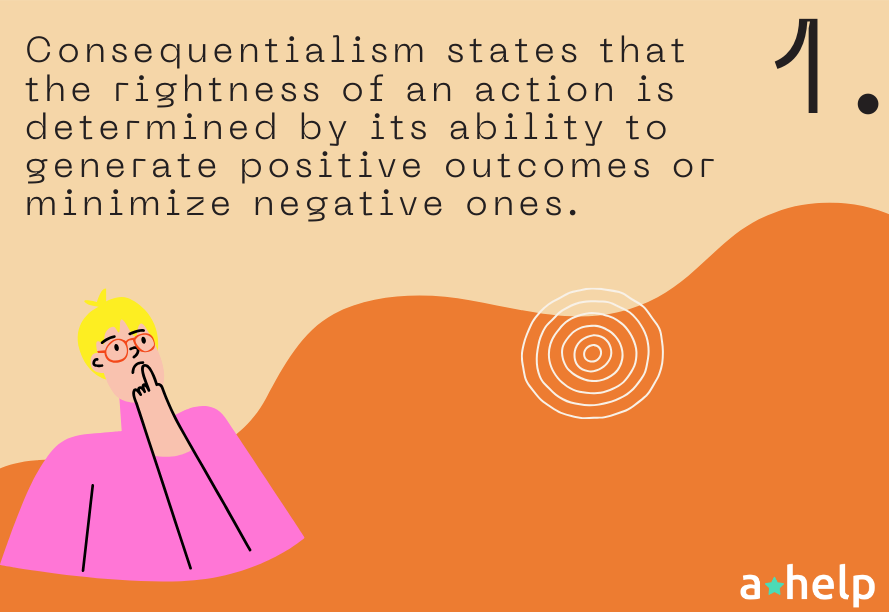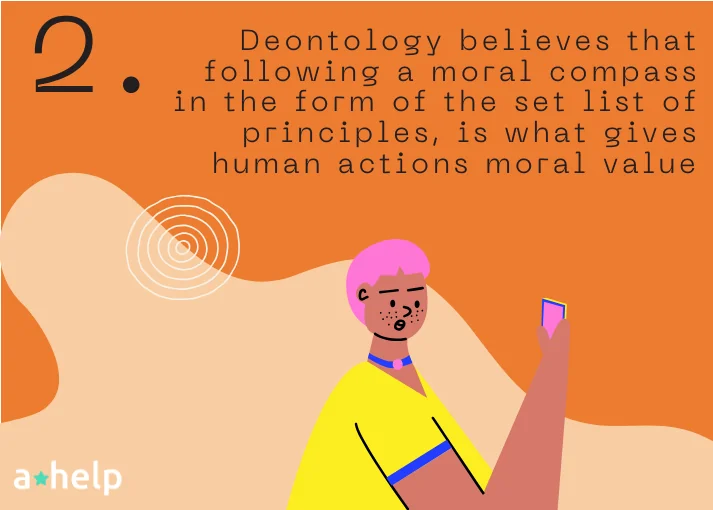Ethics is a very subjective and debatable subject. So no wonder that there’s a whole discourse around the two most popular approaches in the field: consequentialism vs deontology. Yes, those are big words, and they are even more complex concept-wise. To be frank, the key to understanding this “rivalry” between consequentialism vs deontology is that the followers of the first approach to ethics see that the rightness of the action depends solely on its consequences. Whereas deontologists deny this view and instead believe that it’s the action itself that should be judged for rightness, rather than its consequences.

✅ AI Essay Writer ✅ AI Detector ✅ Plagchecker ✅ Paraphraser
✅ Summarizer ✅ Citation Generator
Understanding Consequentialism
As we figured before, consequentialism is a philosophical approach to ethics that judges the moral worth of an action based on its outcomes or consequences. Put simply, those who follow consequentialism evaluate the results of the actions and not the actions themselves. The most renowned form of consequentialism is utilitarianism, developed by philosophers Jeremy Bentham and John Stuart Mill. Utilitarianism advocates for actions that produce “the greatest happiness for the greatest number” of people.
Core Principals
Consequentialism asserts that the rightness of an action is determined by its ability to generate positive outcomes or minimize negative ones. This approach raises several critical questions: What constitutes a ‘good’ result? How do we measure happiness or well-being? And whose happiness should be prioritized? Answers to these questions vary even among theorists within this theoretical field.
For example, while some consequentialists emphasize individual well-being, others stress the importance of the collective good. There are also debates about whether the criteria for evaluating consequences should be objective (such as health or financial stability) or subjective (e.g. personal pleasure or satisfaction).

In practice, consequentialism challenges us to consider our actions’ broader impact and strive for outcomes that improve overall (and collective) well-being. However, it also presents dilemmas when different actions lead to conflicting results, requiring a careful balancing of competing interests and values.
Putting Deontology in the Simpler Terms
If we take ethics as a spectrum, deontology lies on the other side of this imaginary line, opposite from consequentialism. This theoretical approach focuses more on the morality of actions themselves, rather than their consequences.

Imagine you have a set of moral rules or principles, like “Do not lie” or “Keep your promises.” Deontology says that you should follow these rules no matter what, even if breaking them might lead to a better outcome. It’s like a moral code that tells you what is right and wrong, and you stick to it no matter what. This approach is rooted in the belief that some actions are inherently right or wrong, and that moral principles should guide our behavior.
Immanuel Kant – the Father of Deontology
One famous deontologist, Immanuel Kant, believed that these moral rules should be universal, meaning they should apply to everyone in every situation. Moral actions, therefore, are those performed out of a sense of duty, rather than for the sake of the consequences they produce. For example, if lying is wrong, then it’s wrong for everyone, all the time. He thought that following these rules is what gives our actions moral value.

With such a view on Ethics, Kant introduces the concept of categorical imperatives as maxims that must be followed unconditionally. These include:
- the principles of universalizability (acting only according to maxims that can be universally applied),
- treating humanity always as valuable in itself, not just as a tool to achieve something else,
- and respecting the autonomy of every rational being.
In such rationalization, Kant still distinguishes between subjective principles of action (maxims) and universal moral laws. Only maxims that can be formulated as categorical imperatives have moral worth, meaning only those rules can be called moral and valuable, that can be followed and applied to everyone.
Deontology is different from other ethical theories that focus on the results of our actions. Instead of worrying about what will happen, deontologists focus on doing the right thing according to their moral principles. This approach can be challenging because it doesn’t allow for exceptions, even if breaking a rule might seem like the best option in a particular situation. But for deontologists, it’s the commitment to these principles that matters most.
Conclusion
The ethical debate between consequentialism and deontology highlights two key approaches to moral reasoning. Consequentialism evaluates the morality of an action based on its outcomes, advocating for choices that lead to the greatest overall well-being. Deontology, on the contrary, emphasizes the intrinsic rightness or wrongness of actions, following the universal moral principles regardless of the consequences. While consequentialists prioritize the ends, deontologists uphold the means. Both theories offer valuable insights into ethical decision-making, and their differences only emphasize the complexity of moral philosophy.
FAQ
Follow us on Reddit for more insights and updates.






Comments (0)
Welcome to A*Help comments!
We’re all about debate and discussion at A*Help.
We value the diverse opinions of users, so you may find points of view that you don’t agree with. And that’s cool. However, there are certain things we’re not OK with: attempts to manipulate our data in any way, for example, or the posting of discriminative, offensive, hateful, or disparaging material.